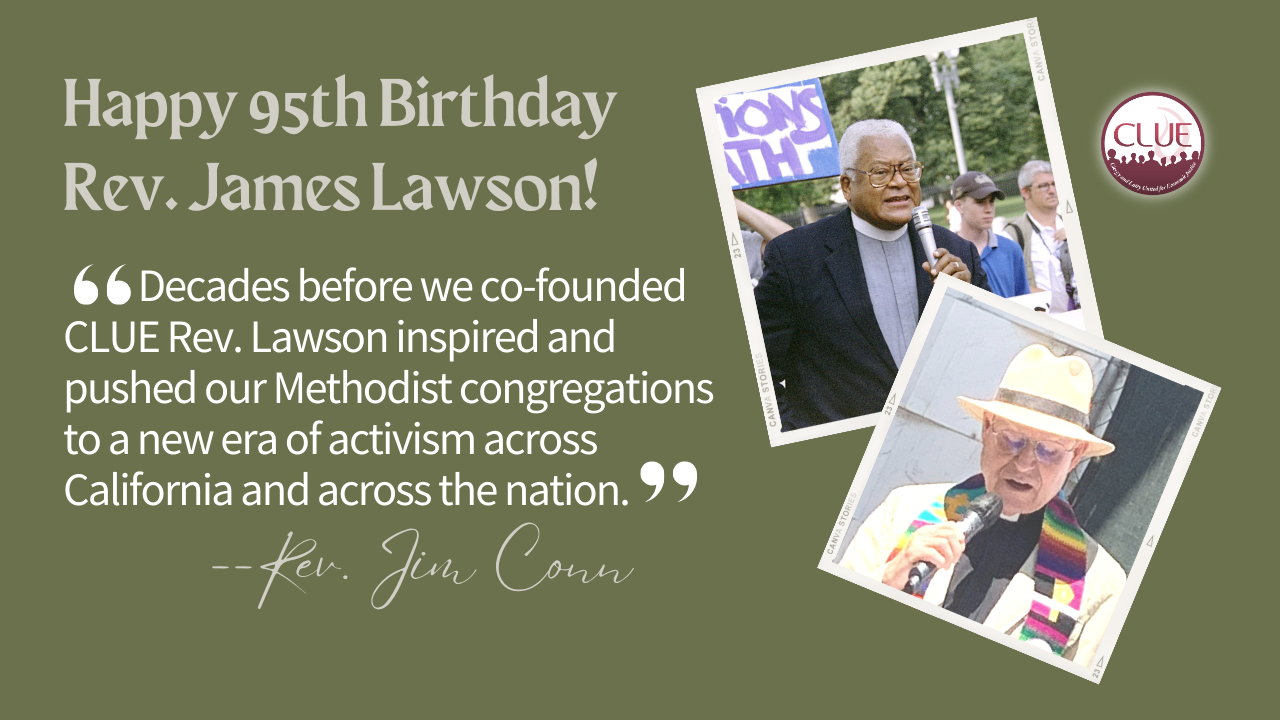Though retired from professional life, Rev. Jim Conn continues to show up wherever he is asked, to amplify the voices of workers and immigrants seeking dignity and justice in society and to call on leaders to do the right thing for those without access to power.
He is the founding minister of the Church in Ocean Park and served on the Santa Monica City Council and as the Mayor of Santa Monica. He is a co-founder of CLUE.

I met Rev. James Lawson soon after he came to Los Angeles from Memphis TN. We had a new bishop in the California-Pacific Conference of the United Methodist Church (UMC). Bishop Charles Golden was the first African-American UMC bishop elected outside the old segregated conferences of the church, and he came to Southern California from a tenure as the UMC bishop of the San Francisco Area. He wanted Lawson at Holman – the largest African-American UMC congregation in Southern California. And he wanted me to start what came to be called “the Church in Ocean Park.”
Bishop Golden also wanted a Board of Church & Society for the region that would present high profile social justice issues from a theological perspective. He appointed Rev. Lawson to chair the board, and he appointed me as a member of the Board. That’s when I met Rev. Lawson.
This was the mid-70s. People were sitting in lines to buy gasoline at unheard of prices. Progressives were writing books about “Economic Democracy,” but people everywhere were talking about inflation and an economy that no longer seemed to be for them. There was an urgency about civil rights and voting rights and women’s rights. And economic rights.
The Board met twice a year, fall and spring. The fall meeting debriefed the Annual Conference session that had been held the previous June. The spring gathering looked ahead to the next Annual Conference. What issues would we speak about? What resolutions would we bring to the floor for adoption that burned with justice?
That’s where Rev. Lawson was so vital. He brought issues of economic and social justice to the Board, concepts that inspired us, pushed us to think. Then late into the night it was my job to reduce the vision to words that would find their way to the floor of the Annual Conference for debate and disposition.
We picked issues and framed them in ways that pushed church delegates to think about ethical matters in their own churches, their own communities, as well as across the land.
Sometimes we succeeded. Sometimes we didn’t. I remember one time when we called for a national oil corporation to take the profit out of the oil industry. We lost. Then we brought it back a year later, and this time people were ready to vote for it. Similarly, “economic democracy” did not carry the first time we presented it, but then it did.
The key to the success of these declarations – that spoke both to the larger arena as well as to people’s lives – was Rev. James Lawson whose wisdom guided the Board into a new era of activism in the nation and among congregations.